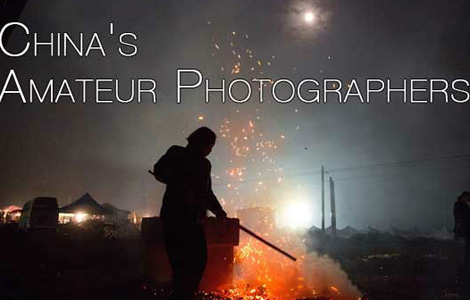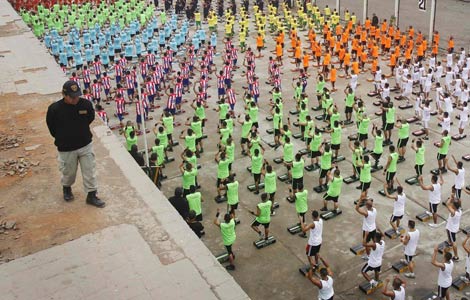Bombings, shootings kill 23 in Iraq
Updated: 2013-06-17 05:27
(Xinhua)
|
|||||||||||
BAGHDAD - Up to 23 people were killed and 133 wounded in a series of car bomb attacks and shootings in Iraq on Sunday, amid growing sectarian tension in the country that pushed the UN envoy to Iraq to call on Iraqi leaders to hold dialogue to solve their disputes in order to avoid slipping the country into widespread killings.
Two car bombs went off in al-Arousah Square in the center of Basra, some 550 km south of the Iraqi capital of Baghdad, killing five people and wounding 10 others.
Meanwhile, two car bombs exploded in two areas in Nasriyah, some 375 km south of Baghdad, killing two people and wounding 35 others.
In central Iraq, a car bomb hit the city of Aziziyah killing a civilian and wounding 10.
Separately, a car bomb was detonated in the industrial area in the city of Kut, 170 km southwest of Baghdad, wounding 14.
Another car bomb went off in the town of Mahmoudiyah, some 30 km south of Baghdad, killing one and wounding five others.
Elsewhere, two civilians were killed and 18 wounded when a car bomb went off at a popular vegetable marketplace in the holy Shiite city of Najaf, some 160 km south of Baghdad.
In the town of Madain, some 30 km south of Baghdad, a car bomb and a roadside bomb hit a police patrol in the town, killing a policeman and wounding seven others.
Two more car bombs ripped through the town of Mahawil, some 70 km south of Baghdad, at least wounding six people.
In Baghdad, two people were killed and 10 wounded when a bomb planted at a coffee shop went off in the evening in New Baghdad district in eastern the capital, an Interior Ministry source told Xinhua on condition of anonymity.
In northern Iraq, six policemen guarding a pipeline exporting crude oil were killed, including a police officer, and five were wounded when gunmen broke into their outpost in Hatra area in south of the city of Mosul, some 400 km north of Baghdad, a local police source anonymously told Xinhua.
The police force was tasked with guarding the oil pipeline that exported crude oil from Iraq's northern province of Kirkuk via Turkey's port of Ceyhan, the source said.
In a separate incident, a roadside bomb struck a police patrol in the city of Tuz-Khurmato, some 200 km north of Baghdad, killing two policemen and wounding another, a local police source said.
Also in the day, a car bomb parked outside a restaurant on a main road in south of Mosul exploded and killed a soldier and wounded four others, along with three civilians, a local police source said.
Separately, Major General Ali al-Frieji, commander of Iraqi Army's 2nd Division stationed in Mosul, escaped unharmed a roadside bomb explosion near his convoy in western Mosul, which wounded three of his bodyguards, the source said.
Moreover, Colonel Abed Traiba, chief of a police commando brigade in Mosul, escaped unharmed another roadside bomb near his convoy of vehicles in southern the city, which wounded two of his bodyguards, the source added.
No group has so far claimed responsibility for the deadly attacks, but the al-Qaida front in Iraq, in most cases, were allegedly responsible for such massive attacks in the country, raising fears that the terrorist group and other militia could return to widespread violence.
The top UN official in Iraq, Martin Kobler, condemned the deadly bombings in several Iraqi provinces on Sunday.
"The Special Representative of the United Nations Secretary- General for Iraq, Mr. Martin Kobler, strongly condemns the latest wave of car bomb attacks that targeted crowded areas in several Iraqi cities during rush hour, killing and injuring dozens more innocent people," the UN mission in Baghdad said in a statement.
Kobler reiterated his call on "all Iraqi political leaders to sit together with good faith and determination, to address all pending problems that the country continues to face," the statement said.
Violence and sporadic bomb attacks are still common in Iraqi cities despite the dramatic decrease in violence since its peak in 2006 and 2007, when the country was engulfed in sectarian killings.
Related Stories
9 killed in attacks against mosques in Iraq 2013-05-21 03:00
13 killed, 72 wounded in Iraq car bombings 2013-05-20 16:30
Bombs kill more than 35 across Iraq 2013-05-16 10:21
21 killed, 78 wounded in attacks in Iraq 2013-04-29 19:37
Over 50 killed in violence across Iraq 2013-04-24 09:22
Today's Top News
China condemns attack on students in France
Obama, Putin face tough talks at G8 summit
Czech PM steps down amid scandal
Policies to boost cross-Straits ties
Courts feel trials of global economy
Experts puzzled by state of economy
Exchanges key to promoting TCM
'HK laws apply to Snowden case'
Hot Topics
Lunar probe , China growth forecasts, Emission rules get tougher, China seen through 'colored lens', International board,
Editor's Picks

|

|
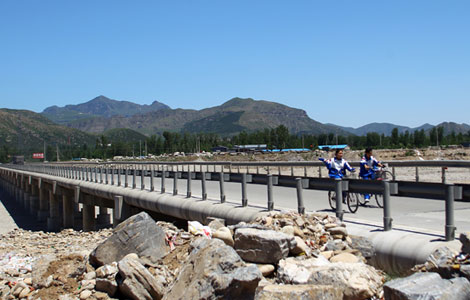
|

|
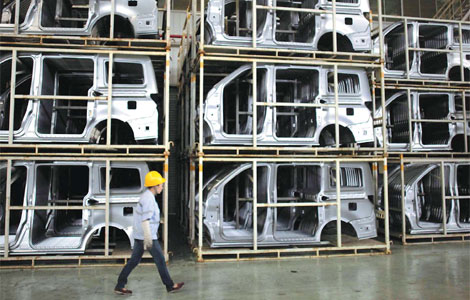
|
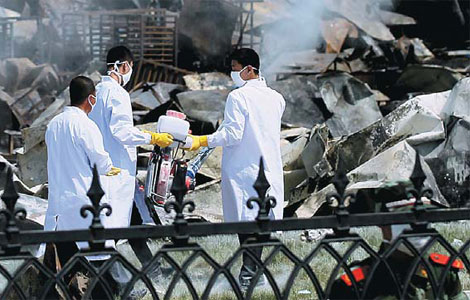
|
